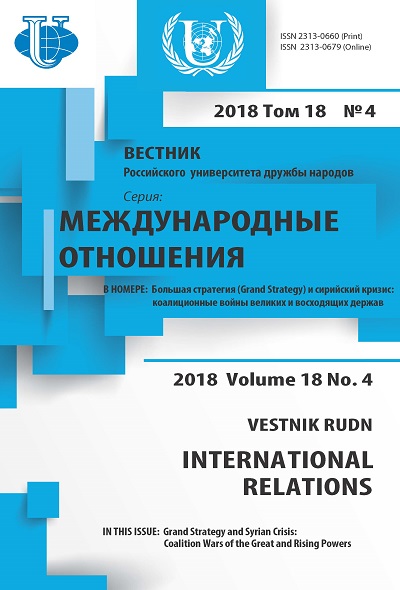‘Mutually Assured Obstruction’? Russia, the West and Political Dilemmas of Syria’s Reconstruction
- 作者: Bartenev V.I.1
-
隶属关系:
- Lomonosov Moscow State University
- 期: 卷 18, 编号 4 (2018): Grand Strategy and Syrian Crisis: Coalition Wars of the Great and Rising Powers
- 页面: 755-774
- 栏目: THEMATIC DOSSIER
- URL: https://journals.rudn.ru/international-relations/article/view/20322
- DOI: https://doi.org/10.22363/2313-0660-2018-18-4-755-774
如何引用文章
全文:
详细
In the view of an apparent change in balance of power in Syria in 2017-2018 the challenges of reconstruction of the territories affected by a durable and highly destructive conflict have quickly risen to the forefront of the international agenda. A sheer scope of physical damage and humanitarian crisis in the country and a catastrophic lack of financial resources needed to mitigate consequences of a military confrontation and come back to normal life leave no doubt that the reconstruction process will imply a considerable external support. This paper identifies the particularities of Russia’s and the Western countries’ approaches to Syria’s reconstruction based on available public sources and their respective perceptions of related political dilemmas. Such a comparison has been made neither by Russian scholars who have touched upon the reconstruction agenda only sporadically or examined only the Russian motives, nor by foreign experts who have not studied the Russia’s initiatives scrupulously yet. The first section summarizes publicly available information about the bilateral Russian-Syrian dialogue on reconstruction and the main dimensions of the Russian efforts aimed at ensuring a more active engagement of the established donors in reconstruction of Syria. The second section examines the origins and a subsequent evolution of the key representatives of the ‘Group of Friends of the Syrian People’ (primarily, the U.S. and the EU countries) positions on rebuilding Syria. Special attention is paid to identifying similarities and differences between the circumstances surrounding Syria’s reconstruction and the international context around implementation of other large post-conflict reconstruction programs, primarily in Iraq and Afghanistan. The conclusion is drawn that ‘mutually assured obstruction’ and the development of two parallel reconstruction processes to the west and to the east of the Euphrates River will have an extremely negative impact on both Syria and a wider region. Prevention of this scenario entails a wide range of reputational, economic and political-strategic risks for all actors inside and outside Syria.
作者简介
Vladimir Bartenev
Lomonosov Moscow State University
编辑信件的主要联系方式.
Email: vladimir.bartenev@fmp.msu.ru
PhD in History, Associate Professor, Director for Center for Security and Development Studies at the School of World Politics, Lomonosov Moscow State University
参考
- Ageev, A.I., Loginov, E.L., Zoidov, K.Kh. & Medkov, A.A. (2017). Restoring Syrian Economy: Formation of Russian Infrastructural Nucleus in the Middle East Node of the World Strategic Projects. Economic Strategies, 19(1), 6—23. (in Russian).
- Aksenenok, A.G., Kuznetsov, V.A., Naumkin, V.V., Soukhov, N.V. & Zvyagelskaya, I.D. (2017). The Middle East: Darkness before the New Dawn? Regional Conflicts and the Future of the Global Community // Valdai Discussion Club, June. (in Russian).
- Alaaldin R. et al. (2018). A 10-degree Shift in Syria Strategy. Brookings Institution. Policy Brief. September.
- Amara, J. (2016). Economic Development and Post Conflict Reconstruction. Routledge.
- Asseburg, M. & Oweis, K.Y. (2017). Syria’s Reconstruction Scramble: in a Game Fraught with Political Risk, Europe Should Aim for Long-Term Stabilization. SWP Comments, 51.
- Barakat, S. (2013). Reconstructing Post-Saddam Iraq. Hoboken, Taylor and Francis.
- Brown, F.Z. (2018a). Seeing Like a State-builder: Replication of Donor Reconstruction Dilemmas in Syria. Politics of Post-Conflict Reconstruction. Beirut, Carnegie Middle East Center, 8—13.
- Brown, F.Z. (2018b). Dilemmas of Stabilization Assistance: The Case of Syria. Washington, DC: Carnegie Endowment for International Peace.
- Daher, J. (2018). The Syrian Reconstruction Question, Issues and Dynamics. Fondation pour la Récherche Stratégique, Avril.
- Freear, M. (2016). Syrian Stabilization and Reconstruction. Lessons Learned for a Post-Conflict Syria. White Paper. American Security Project, June.
- Gates, S., Hegre, H., Nygård, H.M. & Strand, H. (2012). Development Consequences of Armed Conflict. World Development, 40(9), 1713—1722. DOI: https://doi.org/10.1016/ j.worlddev.2012.04.031.
- Girod, D.M. (2015). Explaining Post-Conflict Reconstruction. NY, Oxford University Press.
- Heydemann, S. (2018a). Beyond Fragility: Syria and the Challenges of Reconstruction in Fierce States. Brookings Institution, June.
- Heydemann, S. (2018b). Civil War, Economic Governance & State Reconstruction in the Arab Middle East. Daedalus, 147(1), 48—63. DOI: https://doi.org/10.1162/DAED_a_00473.
- Heydemann, S. (2018c). Reconstructing Authoritarianism: the Politics and Political Economy of PostConflict Reconstruction in Syria. Politics of Post-Conflict Reconstruction. Beirut: Carnegie Middle East Center, 4—21.
- Khodynskaya-Golenishcheva, M.S. (2019). Syria: Long Road from War to Peace. Multilateral Diplomacy of the Syrian Conflict Resolution. Moscow: Abris. (in Russian).
- Kuznetsov, V.A., Naumkin, V.V. & Zvyagelskaya, I.D. (2018). Russia in the Middle East: The Harmony of Polyphony. Valdai Discussion Club, May. (in Russian).
- Langer, A. & Graham, K.B. (2016). Building Sustainable Peace: Timing and Sequencing of PostConflict Reconstruction and Peacebuilding. NY, Oxford University Press.
- Naumkin, V.V., Soukhov, N.V., Kuznetsov, V.A. & Zvyagelskaya, I.D. (2016). The Middle East in a Time of Troubles: Traumas of the Past and Challenges of the Future. Valdai Discussion Club, August. (in Russian).
- Reconstruction Calling? Towards a Different EU Role in Rebuilding Syria. (2018). 11.Report.








